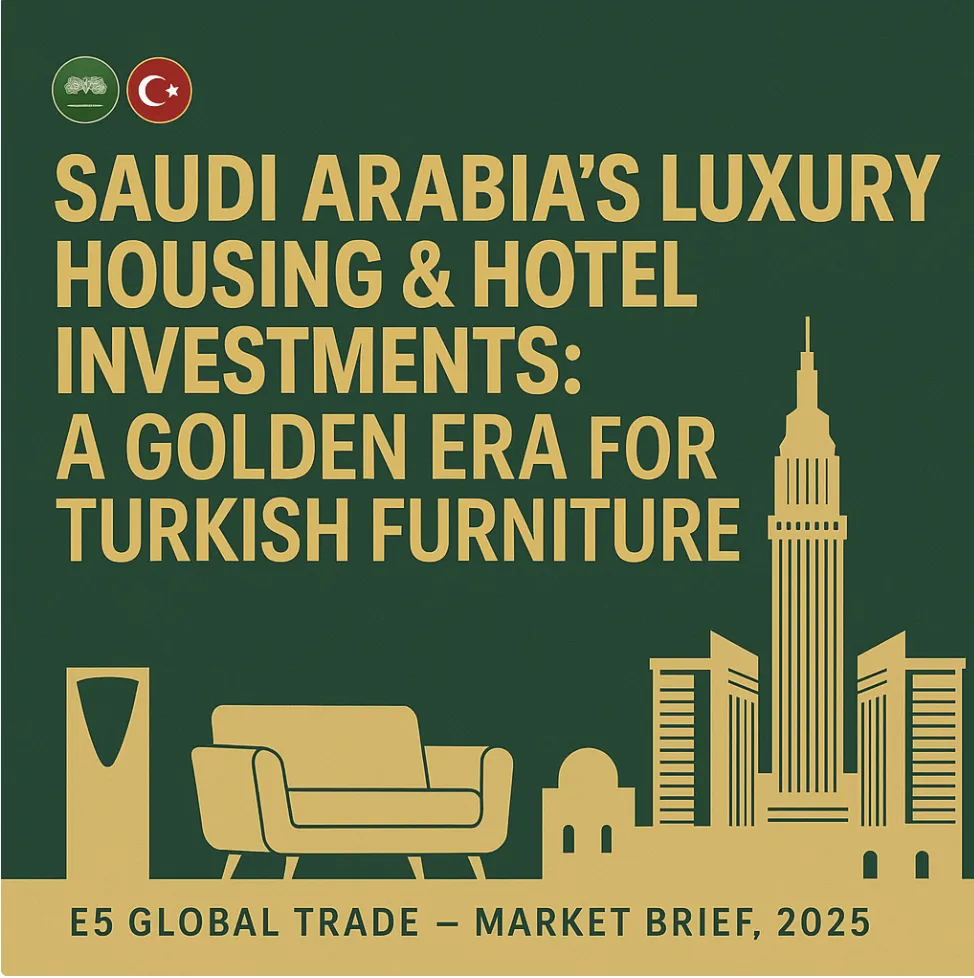Luxury Housing and Hotel Investments in Saudi Arabia: A Golden Era for Turkish Furniture
Introduction: New Living Spaces in Saudi Arabia
Since the early 2020s, Saudi Arabia has entered a phase of rapid socio-economic transformation. Within the framework of Vision 2030, the country has launched mega projects not only to reduce its dependence on energy but also to create modern cities, luxury housing, tourism hubs, and international hotel chains, positioning itself as a global attraction center.
One of the most visible reflections of this transformation is the rising demand in the construction and interior design sectors. New urban projects, tourism zones, and prestigious residential areas bring with them an increased need for furniture and interior décor. This is where Turkey comes into play: Turkish furniture, with its balance of quality and price as well as its wide design range, has established a strong presence in the Saudi market.
📌 Note: New housing projects in Riyadh, Jeddah, and Mecca, along with hotel investments on the Red Sea coast, are set to create record-breaking export opportunities for Turkish furniture in the coming years.
The Rise of Housing and Hotel Investments in Saudi Arabia
Mega Projects and Their Impact
- Neom Project: With a $500 billion budget, Neom is set to become one of the most modern cities in the world. Innovative, functional, and sustainable furniture and décor products are preferred in this project.
- Red Sea Resorts: Luxury hotels and global resort chains create significant opportunities for Turkish furniture producers. Durable and aesthetically pleasing products are the top choice.
- Riyadh Transformation: New residences, office towers, and villa projects in the capital have fueled rising demand for luxury segment furniture.
Consumer Expectations
For Saudi consumers, furniture is not just functional—it is also a symbol of prestige and status. Therefore:
- Luxury villas favor custom-made wooden furniture.
- Modern residences prefer minimalist and functional designs.
- Hotels demand durable, internationally certified Horeca furniture.
The Strength of Turkish Furniture in Saudi Arabia
From Tradition to Modernity
The Turkish furniture sector enjoys two distinct advantages:
- Traditional craftsmanship: Ottoman and Seljuk-inspired carved wooden furniture.
- Modern design: Minimalist, functional, and ergonomic products.
This diversity allows Turkish furniture to appeal to both the luxury and upper-middle market segments.
Key Product Groups
- Living room sets and sofas.
- Bedroom furniture.
- Office and workplace furniture.
- Hotel, restaurant, and café (Horeca) furniture.
Comparative Analysis: Turkey, China, and Europe
📊 Table – Comparison of Turkish Furniture with Competitors
| Criteria | Turkey | China | Europe (Italy) |
|---|---|---|---|
| Price | Medium (affordable) | Low | High |
| Quality | High (certified) | Moderate | Very high |
| Design | Traditional + modern | Mass production | Luxury, limited |
| Delivery | 5–7 days | 30–40 days | 10–15 days |
| Flexibility | Custom, small batches | Mass, large lots | Limited flexibility |
👉 This table clearly shows that in the Saudi market, Turkish furniture is the most competitive player in the price–quality–delivery triangle.
Turkish Furniture in the Horeca Sector
For hotels, restaurants, and cafés, furniture selection is assessed not only for aesthetics but also for durability, safety, and international certification.
- Hotels: Turkish firms supply furniture for five-star hotel projects.
- Restaurants: Durable wood–metal combinations are in high demand.
- Cafés: Modern and comfortable designs appeal to younger demographics.
📊 Table – Turkish Furniture Share in Horeca Projects (2025 Forecast)
| Segment | Market Share (%) | Key Products |
|---|---|---|
| Hotels | 45% | Bedroom sets, lobbies |
| Restaurants | 35% | Tables, chairs, bar sets |
| Cafés | 20% | Modern seating sets |
Turkey’s Strategic Advantages
- Fast logistics: Shipment from Istanbul to Riyadh within 5–7 days.
- Certification strength: ISO, OEKO-TEX, and CE compliance.
- Flexible production: Ability to quickly fulfill even small orders.
- Design variety: Both classic and modern options for diverse customers.
Risks and Challenges
- Price competition with low-cost producers from China and India.
- Complex Saudi customs procedures.
- Limited brand presence and lack of Turkish showrooms.
- Fluctuating freight costs.
SWOT Analysis
📊 Table – SWOT Analysis of Turkish Furniture in the Saudi Market
| Strengths | Weaknesses |
|---|---|
| High-quality furniture | Lack of showrooms |
| Price–quality advantage | Low brand recognition |
| Fast logistics & delivery | Intense price pressure |
| Opportunities | Threats |
|---|---|
| Vision 2030 mega projects | Competition from China/India |
| Luxury hotels & Horeca sector | Regulatory & customs issues |
Looking Ahead: A Golden Era for Turkish Furniture
Beyond 2025, Saudi Arabia is set to attract global attention not only for its energy investments but also for its construction and tourism projects. Within this transformation, Turkish furniture will gain long-term growth momentum thanks to high quality, fast delivery, and cultural affinity.
📌 Experts predict that over the next five years, Turkish furniture will be used in 30% of luxury housing projects and 40% of new hotel investments in Saudi Arabia.
Conclusion
Saudi Arabia’s transformation into a global hub for luxury housing and hotels represents a golden opportunity for Turkish furniture manufacturers. With shared cultural roots and a competitive edge in quality and price, Turkish firms are well positioned to strengthen their foothold in this rapidly growing market.
👉 E5 Global Trade helps companies seize these opportunities by providing:
- Direct connections with Saudi importers.
- Access to hotel and Horeca projects.
- Logistical and trade support to build international brand recognition.


